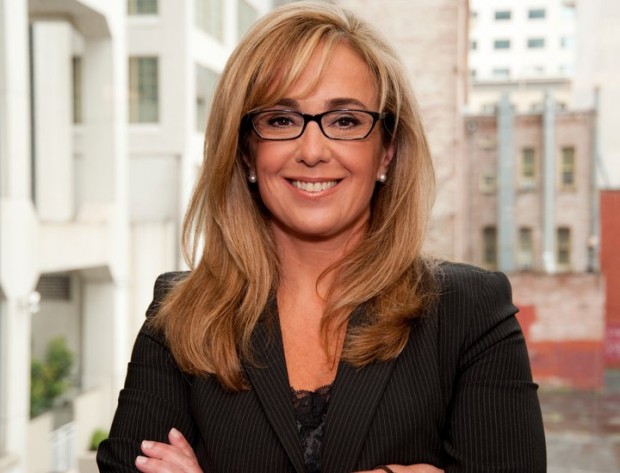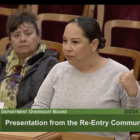Third interview is with Sharmin Bock
One of the more important and most overlooked races in San Francisco is the campaign to be the city’s next district attorney.
When Kamala Harris left the post for state office last year, outgoing Mayor Gavin Newsom appointed then-Police Chief George Gascon to take her place. Now, Gascon is running for a full four-year term, but faces stiff competition from four other candidates.
Previously, we spoke with Bill Fazio and David Onek. Today we feature Sharmin Bock, a San Francisco native and longtime prosecutor in Alameda County, known especially for her work on child sex trafficking. Bock sat down with the San Francisco Public Press’ Jason Winshell and Hank Drew.
Q: What is the one policy goal you hope to accomplish in your first year in office? Has this been your main campaign pledge?
A: The one policy goal? That’s a tough question. What is my one policy goal? I have multiple goals that I want to achieve. And I don’t know if you can exclude one, single out one. Because I’m certainly not going to be a one issue DA.
Q: But start with the top one.
A: First and foremost the DA’s main job is to keep everyone safe from the most violent and dangerous criminals which unfortunately all too frequently roam our streets. So my first priority is DA is going to be justice for victims, safety for the community. There are ways that we can achieve that. We have a big issue with regard to the crime lab here in San Francisco. I would like to see that transformed into a fully functioning crime lab. I would like to implement the same multidisciplinary collaborative approach that I was tapped to spearhead in Alameda County with regard to an unsolved crimes unit where we have at the table criminalists, coroner, and when necessary, police and DA’s who triage the backlog of DNA cases we have here in the city. The word DNA is very sterile. But we’re talking about her people’s loved ones in boxes where their cases have not been solved. And our failure to address those cases essentially permits out in the open rapists, serial murderers, serial criminals. And that doesn’t keep us safe. So my first priority is really to ensure accountability for the most dangerous criminals and to give justice to families who have been waiting for a long time.
Q: What characterizes efficiency [in getting these cases solved and to trial]?
A: What characterizes efficiency in the context of cold cases is to triage them and see which cases percolate up to the top. That’s not something I can answer just very quickly. There’s criteria that we utilize, conversations that we have. Actually it’s a collaborative discussion where you’re talking with the police, you’re talking to the crime lab scientist to see you know “Hey, did we look under her fingernails? Did somebody test the rope that she was hung from the tree with?” I can give you an example of the kinds of things that we can do. We had a case in Alameda County that was over 20 years old. And a woman had been raped and sodomized. DNA was in her every orifice. She was a prostitute. The case had been shelved. Twenty years later I’m looking at the most gruesome photographs I have ever seen in my life and I’m thinking, wow. We haven’t figured this out. And it turns out that after the woman had been raped, and brutalize, she had been hung with a rope by her neck and her left ankle. Imagine it up by your ear. And she was then set on fire and burned.
So what does efficiency mean? Efficiency means figuring out what the hell happened. And ensuring accountability. The woman who had been hung from a tree didn’t have justice for 21 years. When she died she had a 6-year-old child. That child grew up in foster care. So efficiency there meant figuring out who killed her. And we did that by reenacting basically how that whole thing went down and finding his DNA on the rope. So efficiency meant tying him to the murder not just sex with the prostitute.
Q: What unique challenges affect law enforcement and prosecution of crime in San Francisco, if there are any unique challenges?
A: San Francisco is a very diverse community. It’s a very progressive community. I’m not sure that’s necessarily a unique challenge because for example Oakland is a very diverse and progressive community. I think of the challenges we face in law enforcement apply across the board whether you’re in a small city or big city; whether you’re a progressive city or conservative city.
Basically, the issue of accountability, the issue of innovation, the issue of recidivism and how we choose to address those apply even outside of San Francisco. Let me give you an example. Regionalization, I think, is the wave of the future. It makes sense for us to collaborate with multiple agencies and disciplines and partners to solve local community issues.
Q: What you think the biggest impact the DA can have on a community?
A: I think confidence. I think trust and confidence.
Q: Community trust and confidence in the DA’s office?
A: Yes. That you know that your DA is independent. That you know your DA is professional. That you know your DA is experienced and that your DA is doing what she needs to do to deliver the results you deserve as a taxpayer, as a citizen, as a member of that community.
Q: Are there any specific, unique challenges that affect law enforcement and prosecutions in San Francisco?
A: That’s a tough one, when you say San Francisco. I think a big challenge right now is the really realignment were having. When a critical juncture here.
Q: What does realignment mean?
A: Realignment is we, as a result of what’s happened in Sacramento, we now have a situation on our hands in which we have hundreds, thousands of people who are going to be released early from prisons and released back into our community. The realignment refers to the fact that instead of having the state handle it, handle this issue, the issue is going to be one in which the local agency is going to be the primary agency responsible for handling everything from probation violations to parole violations to how do you deal with the housing situation.
So it’s a big challenge. You are, we are going to need to figure out what to do when we have so many people coming back into our community. Where are they going to live? What are their jobs going to be? How are they going to be supported? How are community interests going to be protected?
There is a very – there’s not just a balancing act, there’s a logistical issue as well in terms of physically how are we going to deal with this problem. So, in addition to that we cannot have the same number of people entering our system because is going to create just an inconceivable logjam of humanity. So we need to not just have a plan for the reentry, right, of convicted felons into our community. But we also need to have in my view, a plan for the new entry of people into the criminal justice system.
Somebody, for example, in Bayview Hunters Point might not get the autism help they need and that autism might get misdiagnosed by a police officer at night as insubordination. And next thing you know that child is in the criminal justice system and should never have been in the first place. So I’m very actively involved in helping community organizations and civic causes so that kids get the health care that they need. So that we don’t have people entering the system that don’t belong in the system.
Q: You said you are opposed to the death penalty but you’ve refused to categorically rule out seeking the death penalty. Why haven’t you taken this step to completely refuse to ask for the death penalty?
A: The death penalty doesn’t make sense. I have joined 60 other law enforcement officers in our state to move for a ban on the death penalty. Many people have said why don’t you come out and just say flat out you’re never going to seek the death penalty. And that would be a politician’s response. A prosecutor’s response recognizes that we have to make our decisions based on the facts and the law. The law in this state continues to be one in which the death penalty is on the books.
I cannot see a reason to ever utilize that law. But, simply stating in advance of the facts and the law that you’re not going to do it, that’s really not an exercise of discretion, that’s an exercise of personal opinion and bias. And as a prosecutor discretion to be informed, has to be informed based on the facts and the law. So I would institute the same system that Kamala Harris had where a committee reviews each case based on the facts and the law. The final decision is mine. I can tell you based on that committee, Kamala Harris never implemented the death penalty. I can’t see doing that either. But I think that – we’re a democracy. A democracy requires us to look and to hear – to look at the facts, to look at the law, and to hear everyone’s point of view.
Q: A quick follow-up on that. So there hasn’t actually been a person who has been on death row, executed in California in how many years is it now? Quite a few years, right?
A: Right.
Q: And we’re wasting tons of money. Is there anything that the group of DAs can do to push for the ending of the death penalty?
A: Absolutely. And I am involved with that effort, let me say. It costs us $184 million a year extra for the appeals and the housing. And that’s just looking at the state. That’s not even factoring the federal habeas corpus. I think Judge Alarcon’s study didn’t even factor in the federal costs. Just the state alone is $184 million. Then each trial LOP, life without the possibility of parole, versus the death penalty is an additional $1.1 million a year, right?. That’s based on the Alarcon study.
So why are we doing that? Why are we setting aside the moral reasons; setting aside the fact that that it doesn’t deter; setting aside the fact that it’s applied unfairly along racial lines; setting aside all the multitude of factors, that it doesn’t keep communities safe. Just look at the numbers alone, the math. I’m a person who believes in results. Some of the responses I’ve given you show that. Where my thought has gone in terms of how we can be more efficient and more effective to deliver justice to everybody. The death penalty doesn’t do that.
This is a joint production between the San Francisco Public Press and KALW News.










